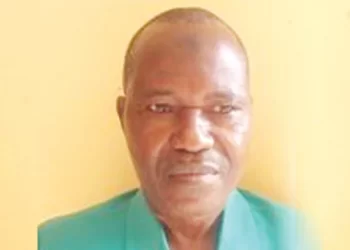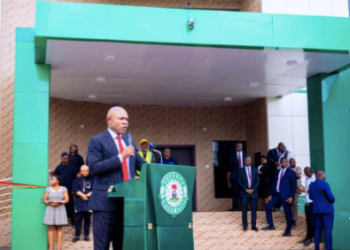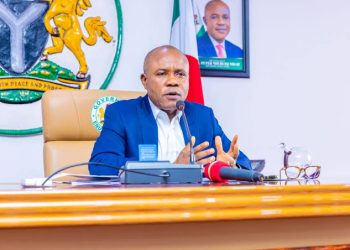By Tunji Olaopa
At independence, Nigeria, amid the euphoria amongst Nigerians and the huge expectations locally and internationally, was confronted with a series of possibilities and challenges that made the prospect of political independence a daunting one. On the one hand, Nigeria had just gained the independence it required to start taking charge of its own political affairs. On the other hand, the new nation must put all its resources together to be able to articulate an ideology of nation-building that will make the nation responsible for its citizens. One of the most immediate challenges Nigeria faced was determining the direction of the Nigerianisation Policy, especially in terms of placing Nigerians into the civil and public services. Since Nigeria emerged from the colonial amalgamation policy, it became extremely important that employment in government business must be done with care. The dilemma that faced the nationalists was to decide between meritocracy and representativeness. Should civil servants be recruited based on merits, stricto sensu, or based on their ethno-religious affiliation, in equal measure?
Understandably, the pendulum of the policy decision swung towards representativeness. This was partly because Nigeria had already become a deeply divided nation, fragmented along multiethnic lines. And partly because of the urgency of constituting a civil service that would be saddled with the task of overseeing the implementation of development policies. One significant consequence of the adoption of the principle of representativeness as the yardstick for recruitment into the administrative cadre of the civil service was the bit of unguarded multiplication and redundancies that came with it, one which assaulted the size, growth and trajectory of the evolving administrative system. Many of the regional leaders, therefore, saw civil and public servants as the representatives of regional rather than national interests. There was thus created within the system a clash of interests: civil servants often faced the pressure to be loyal to their ethnic, regional and even personal interests, which they are expected to use public resources to serve. Furthermore, this divided interest led increasingly to a measure of de-professionalisation as the civil service became inevitably somewhat bloated by reason of the balancing art embedded in the principle of representativeness.
What the foregoing suggests is that the civil service, even in its glorious days of the 1960s, had its high and low points. Modelled after Whitehall, the British civil service, it was nonetheless celebrated at the time for its effectiveness and efficiency in maintaining law and order; in delivering high professional service; and in generating revenue for the colonial authority. Indeed, despite the challenges of transitioning from colonial rule to independence, the challenge of filling in for the capacity gaps created by the exit of colonial expatriates and the heated polity, the service maintained stability and continuity, ensuring that the government machinery functioned effectively. As per the low point, the heated political climate that eventually culminated in military incursion into governance was not the most enabling, but it did not distract the service. As the implementation of the Nigerianisation policy was still ongoing, the service indeed had shortages of skilled professionals and senior-level graduate specialised personnel in many cadres, thus limited in its overall capability readiness in a very significant sense. According to M. O. Onajide (1979:31), “there has been little and inconsistent training resulting in glorified amateurism” at this period in time. Nonetheless, the service earned for itself a reputation within the Commonwealth of Nations for being a beacon of integrity in a significant sense, and for serving as a model for effectiveness and a testament to a well-functioning public service during crucial periods of national emergencies and development.
Lars Kolind (2006), in his book The Second Cycle: Winning the War Against Bureaucracy, identifies three factors that inject a downward spiral and gradual decay in the lifecycle of an organisation before such an organisation achieves maturity and commences the process of reformulating its original vision. These factors are size, age and success. These factors turn a life cycle into a death cycle for any organisation, in spite of whatever success the organisation has achieved. The second factor and the age factor. As the service grows older, it develops traditions, for example, the tradition for dealing with ideas. Decay sets in if age gives tradition preference over innovation. And the older the service gets, the more deeply rooted the preference for tradition becomes. The most dangerous factor, however, is success, because it inevitably leads to self-satisfaction and an unreflective defence of the status quo, even where the once successful system is not necessarily as successful anymore. In other words, it could happen that long after the unique selling point and strength of an organisation have been lost, it continues to live in the illusion that it possesses the secret key to success. Public administration systems behave similarly. Administrative leadership thinks they know what the problem is and simply stop listening and do more of the things they know best. The resulting organisation’s deafness leads to a tendency to react slowly to both weaknesses and opportunities, responding by doing more of the same rather than doing something different from that which perpetuates the status quo.
That was how I interpreted one of the elements of the symptoms of the decay that set into the civil service in Nigeria in my 2018 inaugural lecture at Ibadan. By 1971, the Chief Simeon Adebo Second and Final Commission on Wages and Remuneration concluded its work by calling for a more fundamental review of the organisation, structure and operations of the public service in view of the expanding role of the state and the need to manage the effect of a devastating civil war. It argued that the wages and salary issues that it was called to address were just symptoms of a deeper systemic challenge that Nigeria needed to address. It, therefore, recommended the setting up of another commission, which came to be known as the Public Service Review Commission, led by Chief Jerome Udoji.
The Udoji Report saw the problem of the civil service as that of administrative inflexibility in the idolisation of the status quo, making it therefore hard for the system to internalise and adapt global best practices as a measure of response to positive changes. The non-implementation of the report and evident deafness in receiving the new thinking and the more fundamental idea offered by the report, beyond the wage bonanza, was a missed opportunity for administrative renewal and rebirth, one that would have set the nation on the path to transform a colonial heritage into a postcolonial engine room of a developmental state.
Fast forward, by the time the Muhammadu-Obasanjo military regime got underway in 1975, the rot and corruption in the civil service system, which may not have been so significant in the yesteryears, had multiplied abysmally in the regime’s estimation. With the impact that representativeness and quota system, to attend to ethno-religious balancing created, the decision to critically and massively downsize became almost inevitable in the reading of the new helmsmen, within the general framework of development and governance imperatives. In other words, the regime must have reasoned that if Nigeria was to make developmental progress, the civil service system must be brought into a significant level of professionalism and capability readiness. And hence the purge of the civil service was carried out “with immediate effect”!
The objective of the purge was to ‘sanitise the civil service’ system by eliminating corrupt, inefficient and redundant officials and public servants. The administration was both methodical and severe in its objective through the constitution of panels of inquiries to investigate all allegations of misconduct and corruption, as well as divided loyalty, perceived decline in productivity (through old age), and so on. The investigation led to the compilation of more than 11,000 names, including not only rank-and-file public servants but also the top echelon of the civil service, including the famous and notorious super permanent secretaries. The super permanent secretaries indeed have a place in the annals of administrative history in Nigeria. They emerged at a most critical time when the Nigerian state was witnessing a fragmentary civil war that threatened the unity of the country. And their exceptional administrative credo and credentials went beyond the bounds of the traditional status of the civil servant. It was due to their administrative ingenuity that Decree 31 of 1967 (Public Security decree that outlawed the possession of firearms and ammunition), and Decree 4 of 1968 (the military courts’ special powers to enforce discipline among the Nigerian troops). Indeed, the history of the Nigerian civil war and its administrative dynamics would be incomplete without their extremely competent and committed administrative and developmental policy inputs.
The emergence, unbridled presence and dominance of the super permanent secretary demonstrated two significant facts about the civil service that Nigeria inherited from Britain. It reveals that the system was elitist, class-based, professional and meritocratic. Two, the bureaucracy came into the hands of the military as an ideological instrument for political intervention in the economy. This was especially given the fact that the colonialists deliberately prevented the emergence of indigenous private enterprises while allowing foreign enterprises—Leventis, Cadbury, Lever Brothers, UAC, PZ, Kingsway, etc.—to flourish. Three, this elitist and professional status of the civil service overexposed it, especially during the General Gowon regime, to political intrigues, which possibly brought the super permanent secretaries on a collision course with the political class and the army generals.
And so, it is not surprising that the super permanent secretaries—Allison Ayida, Philip Asiodu, Ime Ebong, Ibrahim Damcida, Ahmed Joda, and many others—were brutally axed by the Muhammed-Obasanjo regime. Other key bureaucrats who retired included Alhaji Sule Katagum (chairman of the then Federal Public Service Commission), Alhaji Abubakar Alli, Mr F.M.C. Obi, Chief J.A. Adeyeye, and many more. The case of Sir Samuel Manuwa—surgeon extraordinaire, Inspector General of Medical Services, and former Chief Medical Director to the Federal Government of Nigeria—was too tragic to be narrated here. The short side of the story is that on September 27, 1975, he was unceremoniously booted from office and given only two weeks to make his way out of his Ikoyi government apartment. He died six months later. Judges were not left out of the severe purge: Dr Taslim Elias (Chief Justice of the Federation), Justice Adewale Thompson, Justice Ebenezer Ayoola, Justice O. Odumosu, Justice F.A. Abina, and others. Other civil and public servants included Alhaji Adamu Atta (Secretary to NEPA), Dr Clement Isong (Governor of the Central Bank of Nigeria), etc. In academia, Professor Horatio Thomas, Nigeria’s first indigenous professor of surgery, was unceremoniously booted from office as the vice chancellor of the University of Ibadan. His dismissal came over a national radio while he was hosting a luncheon for guests, including some global figures who had attended the convocation ceremony at UI.
The downsizing of the civil service created a paradoxical effect. On the one hand, civil and public servants were served a critical notice that they would be brought to account, and that inefficiency and administrative sloth would no longer be condoned. However, on the other hand, the purge crucially undermined institutional morale, performance and productivity. There were several intended and unintended consequences of this arbitrary purge. The first and fundamental one was the loss of experienced officials and officers, and the subsequent destruction of institutional memory across the civil and public services. The names of Asiodu, Elias, Manuwa, Katagum, Thomas, Isong, Attah, etc., represent some of the best institutional and structural resources that the civil and public service has produced. These people embody what ought to have been a generational capital that the civil and public service could deploy in regenerating, consolidating and sustaining the vitality of the system for the continuing possibility of developmental and governance transformation.
The unintended consequence of the 1975 purging of the system is even more debilitating—the institutionalisation of bureaucratic decay and corruption. Civil servants who witnessed the terrible trauma of the downsizing immediately read between the lines and came to the uncomfortable conclusion that the system cannot be trusted. A culture of fear, silence and insecurity emerged that set the civil servants against the system that could traumatise those who have given their lives to serving the public diligently and with commitment. The tenure that used to be trusted has become a source of pragmatic thinking that engendered an ethical problem, which undermines the basis of the very concept of public service. In other words, rather than deferring gratification, civil and public servants are now compelled to seek instant gratification that enables them to secure their future at the expense of the public they are meant to serve.
The civil service purge was a unique one in the annals of Nigerian administrative history. There has never been anything like it after, even when it sadly has ever since become a culture of governance. This statement is not complimentary. It also implies that the Nigerian civil service system has not recovered from the massive erosion of the integrity of the system. Several predicaments of the system can be traced back to this singular moment of a badly implemented policy. One, the ethical framework guiding the operation of public service values was terribly eroded in ways that enthrone bureaucratic corruption arising from the vice of instant gratification. Two, the purge destabilised the internal management control mechanisms around which civil and public servants circumscribe to be more effective and efficient in the performance of their responsibilities. Thus, there was a virtual abandonment of the rule of law, rules and procedures on which the system itself rests. And this remains the case to this day, despite the extensive framework of modernisation through digitisation and computerisation of the system.
Three, the pay and compensation system had become increasingly disarticulated from institutional performance, especially from the 1980s. Wages, in other words, have remained stagnant even in the face of extreme economic downturns and recessions. This deficiency undermined the human resources management dynamics of the civil service. First, there was a massive draining of talent and expertise away from the public to the private sector. Second, those remaining in the system began to look for a coping mechanism that directly undermines institutional structures and processes: the manipulation of travel allowances and per diems, connivance with contractors, outright theft of public assets, and alteration of date of birth to guarantee prolonged tenure. All these constitute a symptom of the fear of the unknown that sudden and unplanned retirement seems to imply for civil servants.
The fourth predicament of the civil service system derives from the non-professionalisation of the MDAs’ departments of planning, research and statistics as the hub of planning and policy analysis. This systemic failure was reinforced by the absence of a culture of town-and-gown policy-research synergy, which has the potential to institutionalise and facilitate the development of policy intelligence and strategic thinking in development management. Lastly, the purge disrupted the key element of esprit de corps, which is necessary as a fundamental factor in the emergence of a community of service and practice that sustains the civil service profession.
The most fundamental lesson to learn in all is simple: what institutional reform initiatives are required to extricate the civil service system from the albatross of the 1975 purge? In other words, how does a commitment to administrative reforms transform the civil service beyond the limitations of 1975? Several reform options and frameworks have to come into play in the urgent need to redeem the institutional integrity and functionality of the system. The obvious starting point for such a reform is the need for a fundamental reassessment of the role of the state and governments, and the implications that this reassessment has for the structure, functions and operations of MDAs. This makes it imperative to articulate a more development-oriented federation through the restructuring of the Nigerian federalism as a framework for macro-institutional governance reform. Such a restructuring challenges us to deeply rethink the politics-administration and policy-implementation powerplay to be able to achieve a more development-friendly partnership between politicians and policymakers in the best tradition of performance management that is grounded on a re-professionalised civil service as the foundation for a developmental state in Nigeria.
The system also has to rethink the urgency of radically improving its own organisational intelligence quotient through (a) a re-professionalisation and reskilling program that increases the capacity of the system for policy intelligence, and (b) the creation of a senior executive service (SES) that embodies the best that the system can offer in terms of the core competence the civil service requires to match Nigeria through the VUCA—vulnerable, uncertain, complex and ambiguous—policy environment of the 21st century. Here, we must defer to Bob Garratt’s thesis that in administration, the fish always gets rotten from the head first. Thus, if the head is reconstituted to become healthy, then the administrative body becomes optimally efficient. This theory enables us to compensate for Nigeria’s overreliance on external policy experts and consultants for technical support as a means of undermining the system’s capacity deficit. Here, I am compelled to suggest the reinvention of the tradition of the super permanent secretary. This is solely from the perspective of the policy intelligence and managerial acumen that the tradition brought to bear on Nigeria’s administrative and governance context.
The next significant reform direction demands the restoration of a competency-based human resource management that is aligned with strong performance management and a talent management system. This requires that the Federal Civil Service Commission undergo a serious institutional reform itself to be able to serve as the gatekeeping mechanism that prevents the wrong people from entering the service, while putting critical matrices in place for scouting, recruiting, incentivising, retaining and promoting the best talents. This also requires a serious commitment to a vision of industrial relations that ensures that the government and labour unions are connected not by adversarial but developmental industrial relations.
The Nigerian civil service system has to leave behind the terrible systemic trauma of the 1975 purge and reinvent itself through a thoroughgoing institutional rehabilitation that restores the capacity and readiness of the bureaucracy as the fundamental pathway to national development.
Prof. Olaopa, Chairman, Federal Civil Service Commission, writes from Abuja.
















































